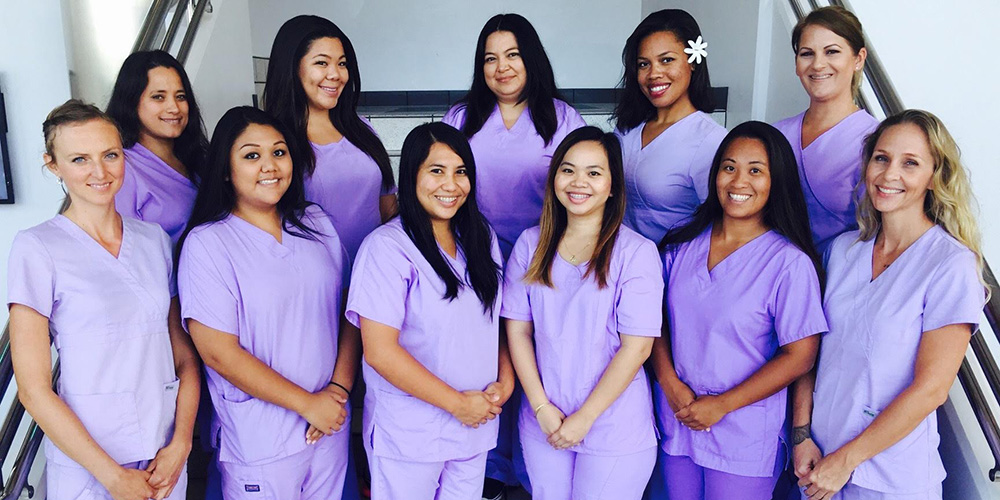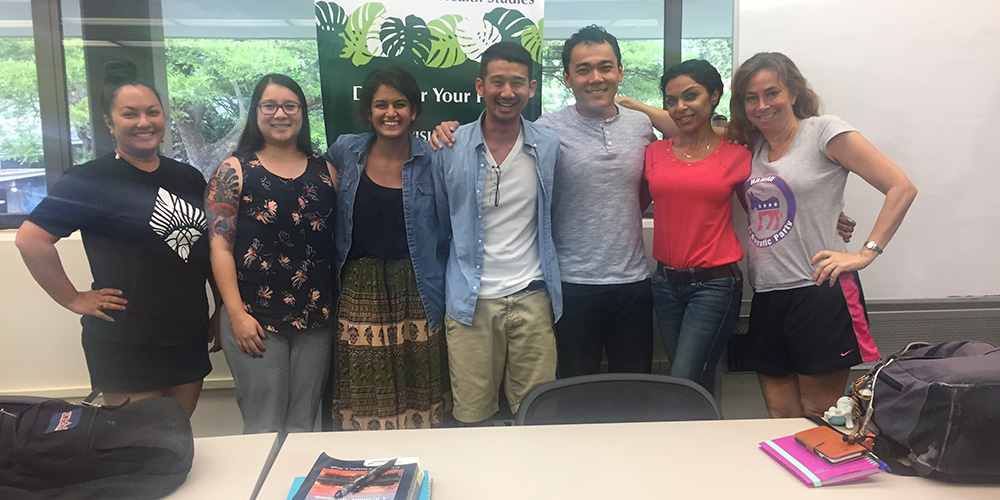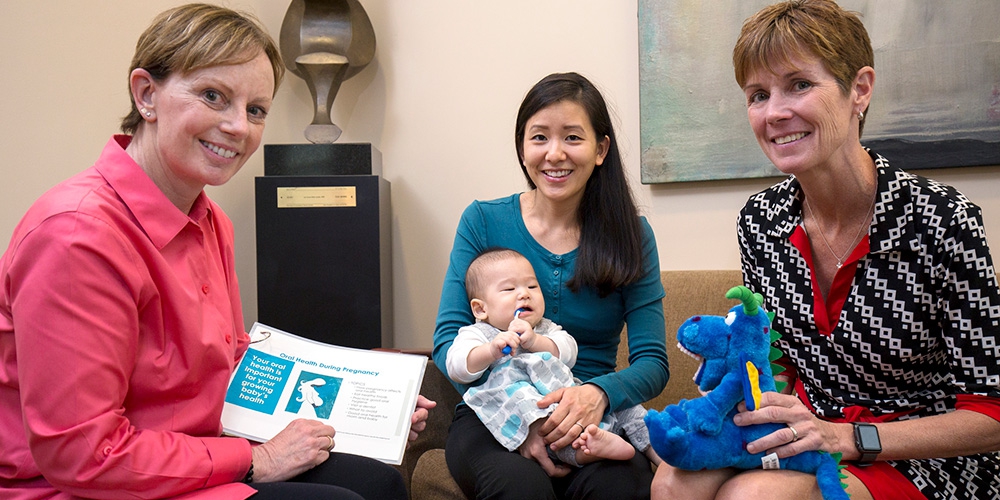Many of Hawai‘i’s families face serious oral health challenges due to a range of issues including the high cost of living, no statewide fluoridation system, no school sealant program, and a lack of oral health education. The Pew Center on the States reviews and assesses states’ performance in a variety of domains. Its reports on oral health have consistently rated Hawai‘i an “F.”
Hawaii Dental Service (HDS) is partnering with the University of Hawai‘i to improve oral health in Hawai‘i by providing grants totaling $211,000 to various UH programs to expand dental services and education, and gain a better understanding of how to overcome the myriad barriers to improved oral health. This investment will help to improve access to care for vulnerable populations in Hawai‘i including pregnant women and families living in rural areas.
“We’re pleased to have community partners like the University of Hawai‘i to help address the oral health needs of our state. The University’s faculty and Dental Hygiene program have been valuable resources to further our mission of improving oral health in Hawai‘i especially for the underserved communities. This is a first step toward our efforts to develop ongoing oral health programs for Hawai‘i’s families,”
- Mark Yamakawa, HDS president and CEO.
Three UH programs are receiving the funding:
$120,059: Improving oral health outcomes for pregnant women & children in Hawai‘i
UH Mānoa Nursing
With funding from HDS, UH Mānoa Nursing is partnering with Kapi‘olani Medical Center for Women & Children’s Women, Infant and Children (WIC) site to gather critical information about the oral health beliefs and behaviors of families, provide culturally appropriate oral health education to high risk families, and connect these families to dental providers in the community for their oral health care.
Oral health is particularly important during pregnancy because of the potential serious perinatal complications associated with dental disease in pregnant women. Yet studies show that most pregnant women in Hawai‘i do not see a dentist during their pregnancy.
“We are committed to improving health through education, research and service. With support from HDS and through strong partnerships with community agencies we can enhance the care of diverse populations in Hawai‘i,”
- Principal investigator Deborah J. Mattheus, Ph.D., CPNP, APRN-Rx, assistant professor at UH Mānoa Nursing.
$60,000: Expanding UH Maui College Oral Health Program community outreach
UH Maui College
People living in rural areas such as Maui County face a multitude of barriers when seeking dental care. These barriers can include dentist availability, ability to pay, transportation issues and others. Not only are there fewer dentists per capita in Maui compared to places like Honolulu County, but many dentists serving the community limit their practices to private insurance and private pay patients. As a result, patients who seek dental care through the low income programs experience difficulties in finding a participating provider in their immediate service area.
With support from HDS, the University of Hawai‘i Maui College Dental Hygiene Program will expand dental care and support services offered by its Maui Oral Health Program (MOHP) which serves underserved populations on Maui through community outreach and collaboration with local nonprofit agencies.
Dental Hygiene Program Coordinator Rosie Vierra said, “Thanks to HDS, we will be able to expand our services, including free screening and care to the underserved, and also provide education on the importance of oral hygiene to the population as a whole. Because of the generous donation from HDS, the MOHP is able to purchase digital sensors and intraoral cameras and other innovative equipment in an effort to provide the highest quality care for patients of the MOHP.”
$30,710: Needs and assets assessment of oral health services in Hawai‛i
UH Mānoa Office of Public Health Studies
About 25% of adults age 60 and older are missing all of their natural teeth (Centers for Disease Control and Prevention, 2013). Having lost teeth is associated with poorer nutrition and quality of life for adults. Poor oral health also affects children, with long-term consequences.
Approximately 20% of children between 5 and 11 years of age have at least one untreated decayed tooth. Cavities may cause pain and infections, and these issues can lead to challenges with eating, speaking, playing and learning.
While there has been ongoing informal collaboration among oral healthcare stakeholders, there is no comprehensive picture of current services which can help direct a course of action for improvement. With support from HDS, the UH Mānoa Office of Public Health Studies is conducting a statewide assessment of oral health care services (both prevention and treatment), in order to discern potential needs/gaps. Thus far, over 300 individuals have participated in the study, including clinicians, instructors, administrators and researchers.
Preliminary results show that stakeholders are most strongly recommending:
- Improving overall oral health awareness and messaging
- Co-locating oral health programs and services (e.g., at schools, community health centers, etc.)
- Improving oral health among our lower income communities, including outreach, access to services, and appropriate reimbursement for providers that serve these families
- Creating more structure/opportunities for collaboration, both within the oral health community, as well as with allied professions.
The final report will provide recommendations and steps for action to assist HDS and other community stakeholders develop comprehensive plans to improve the state’s oral health.
Jeanelle Sugimoto-Matsuda, DrPH, Assistant Professor, University of Hawai‘i at Mānoa, Office of Public Health Studies (OPHS) and Department of Psychiatry said, “Through this partnership with HDS, the Office of Public Health Studies was able to conduct this much-needed study, and have a part in shaping the State’s overall oral health plans and direction.” Sugimoto-Matsuda continued, “This study also provided a valuable field research opportunity for 10 graduate students at OPHS, who gained firsthand experience in research design and data collection. We were able to connect with a variety of stakeholders, all of whom are doing such amazing work, often with minimal resources. It is our hope that we can translate their stories into action, to increase support for these dedicated individuals and organizations that have such incredible passion and dedication for their work and communities.”

If you would like to support health and wellness programs and students at UH, please contact Associate Director of Corporate and Foundation Relations Laurie Komatsu at 808-956-9402 or [email protected].
# # #
The University of Hawaiʻi Foundation, a nonprofit organization, raises private funds to support the University of Hawaiʻi System. The mission of the University of Hawaiʻi Foundation is to unite donors' passions with the University of Hawaiʻi’s aspirations by raising philanthropic support and managing private investments to benefit UH, the people of Hawaiʻi and our future generations www.uhfoundation.org.
Hawaii Dental Service (HDS)
HDS is the largest dental benefits provider in the state, serving more than 650,000 members throughout Hawaii, Guam and Saipan. It has the largest network of dentists, with more than 95 percent of Hawaii’s licensed, practicing dentists participating with HDS. As a nonprofit founded in Hawaii 55 years ago, HDS is committed to making quality oral health care affordable and accessible. www.HawaiiDentalService.com.

